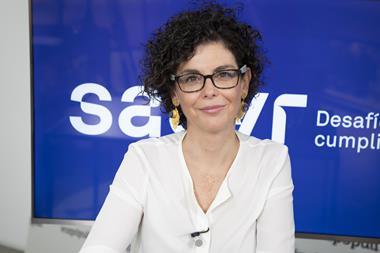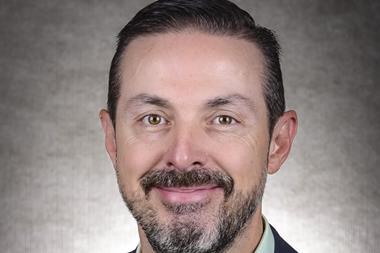Part of the next generation of risk managers promoting the holistic approach, Sogefi Group’s Valentina Paduano believes it is time to rethink your methods
Whether or not a global pandemic was on your risk register ahead of COVID-19, it is clear those organisations with a strong crisis response plan have fared best. This is according to Valentina Paduano, chief risk officer and sustainability director of Milan-headquartered automotive component manufacturer Sogefi Group.
“The main lesson learned from the pandemic was crisis management. A consolidated crisis management plan is something that all companies have to define and maintain within their organisation,” she says. “This is applicable for any kind of risks.”
“Pandemic risk was not really part of companies’ priorities in the past, and if we think back to one year ago, it was really impossible to have a discussion about a pandemic within the organisation. Now of course it’s easier, because we are still in the pandemic and so we have realised that such events can and do happen.”
Those organisations that adapted fastest to the crisis are bouncing back more quickly. IMD in Lausanne has identified logistics/delivery, pharmaceuticals, ecommerce marketplaces and video conferencing among the ‘winning’ sectors, and tourism, traditional retail, investment banking and oil and gas among the ‘losing’ sectors. The ‘in-betweeners’ include banking, healthcare, manufacturing and education.
For in-betweener firms in particular, risk management has had an important role to play in how organisations responded, thinks Paduano.
“In companies which did not have a holistic approach to risk management before the pandemic, and there was no real experience of risk management, the management of the crisis was more difficult,” she observes. “Within these companies it is difficult to be part of the crisis management situation as a risk manager, because the role of the risk manager is not yet well recognised within the organisation.”
New kids on the block
One of a new generation of risk managers, Paduano has always taken a holistic, ERM-approach to risk management. Graduating with a degree in economics from Milan’s Bocconi University in 2008, she began her career in risk management and compliance consultancy, first at Ernst & Young and then at Protiviti.
Whilst at these consultancies she was able to work with organisations from a wide range of industry sectors, honing her craft and developing an appreciation of the need for an enterprise-wide approach to risk.
“Traditionally, risk managers have spent much of their time monitoring and measuring the risks that can be transferred to the insurance market. It is only more recently that the attention has completely changed. This is because the attention of the company should be not only be on those transferable risks but also a growing range of intangible exposures. What we observe is that risk and insurance managers manager are now moving from the old perspective to the new one
“It’s really important to open minds and change perspectives,” she adds. “Starting out my career with a focus on ERM was a big advantage for me. Today, for risk managers like me, this is a big opportunity because we have a different background and a different way of approaching risk management so we can facilitate discussions within our companies.”
In 2014, she joined Italian energy manufacturing giant Prysmian Group as an ERM specialist. The firm, which products transmission and telecommunications cables and systems, gave her the opportunity to gain a lot of experience in a short space of time, working internationally with clients from all over the world.
“I had the opportunity to develop a flexible approach to risk - meeting different people in different contexts - and this is an advantage for a professional risk manager,” she explains. “Risk managers need to be able to understand the context of both their own organisations and their main stakeholders, because risk priorities and appetites can vary quite substantially or, for instance, there are some industries where there is a huge regulatory context.”
A stakeholder capitalist approach
Paduano has been with Sogefi Group since January 2019 and joined the board of FERMA in June of the same year. She gained the FERMA Rimap Risk Management Certification in 2017 and now teaches a range of ERM training courses. It is clear she is passionate both about ERM and doing her part to improve skills and competencies within the profession. Her other great passion is sustainability and she is currently heading up FERMA’s work in this area.
At a European level, issues surrounding sustainability have taken on renewed importance during the crisis, with the EU making the world’s biggest ‘green recovery’ pledge in July 2020, a €750 billion economic stimulus plan focused on creating jobs while moving European economies away from a reliance on fossil fuels.
It is in the area of sustainability that Paduano thinks there is the most obvious link between risk and opportunity, with corporates facing a growing raft of requirements, including climate reporting. There is also a clear role for the risk manager when it comes to ESG issues within the organisation, she says.
“As a first step we need to carry out a risk assessment of ESG metrics, so the function of risk management is involved in this evaluation. The risk community is also heavily involved in supporting the international adoption of a risk-based approach to sustainability.”
“The trouble at the moment is that sustainability is too much of a tick box like exercise, whereas in reality sustainability needs to be embedded in everything we do - and not tackled just from a compliance perspective.”
“At FERMA, we are working to promote sustainability matters within the ERM framework, because we think we think it gives companies the right tools and markers in order to focus on their top priorities from a sustainability point of view.”
“When we speak about sustainability we are speaking about our normal day-to-day business,” she adds. “So the risk manager should carry out all of the reporting and act as a coordinator in discussions around sustainability within their organisations.”
Find your voice
Paduano thinks there has never been a better opportunity for risk managers to have their voice heard on the importance of driving forward ESG issues, and adapting business models to make the most of opportunities in this area.
“The pandemic reflected one of the consequences on our lives and jobs of our impact of the natural environment, so we cannot forget. This is also the reason why the European Commission confirmed its target on tackling climate change and moving to zero carbon, and this is absolutely the right direction to go in.”
“Within the automotive industry, this topic is becoming more and more important every day,” she adds. “Car manufacturers are absolutely oriented to achieve their carbon reduction targets and to have a similar strong commitment by all the suppliers in the supply chain.”
Paduano is a big advocate of communication and collaboration within organisations. In her mind, it has never been more important to break down silos and ensure there is a coordinated approach to risk across the organisation. This includes changing the perception of the role of risk managers. “The risk manager shouldn’t be perceived by colleagues within the organisation as an auditor, but as a colleague and a participant,” she says.
“Risk managers do not always receive the most positive reception, but it doesn’t have to be this way,” she adds. “Many times I have supported my colleagues and reassured them that I am not only a requestor of information but that I can help them to achieve their goals.”




















1 Readers' comment